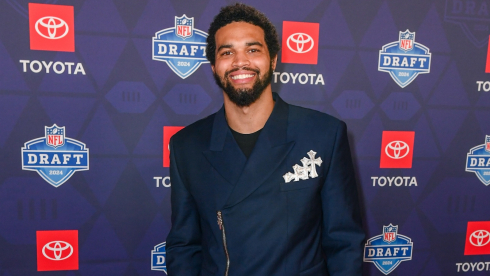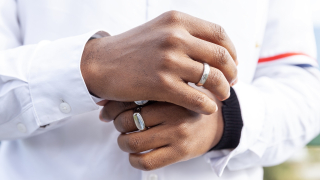On April 1, 1984, Marvin Gaye was infamously shot to death after a domestic dispute with his father in their Los Angeles home one day before his 45th birthday. The shock among his legion of fans was resounding, and ever since, the healing has never quite been complete. Today, on the 30th anniversary of the soul music legend’s tragic passing, his younger sister Zeola Gaye speaks to EBONY.com about the impact Marvin had as an individual, the peace she’s found since, and what she and his family would like to do with the Marvin Gaye legacy.
RELATED: [VINTAGE VISION] MARVIN GAYE GETS IT ON
EBONY: It’s been three decades since your famous brother’s passing. It seems we all remember where we were and what we were doing when we heard he died. But do people still talk to you about that?
Zeola Gaye: It amazes me how people tell me where they were when they heard. I get so many stories, and it’s fine. There are lots of shows where celebrities talk about the day Marvin died, and we’ve all seen and heard those. But one thing I always wanted to do was a piece where normal people tell me where they were and what they were doing. It really amazes me the things I learn.
EBONY: You’ve done My Brother, Marvin: A Memoir and the successful stage play by the same title, setting the record straight on many things concerning your brother. Now, 30 years after his passing, is there anything more you feel you need to say?
ZG: I really just about told everything in the book and in the play. I’d rather dwell more on the book because it goes into detail. There’s really not a lot more I can tell about that particular thing. But there are other things that I would like to talk about that Marvin deserves, like a Marvin Gaye stamp. So I’m going to try to gather petitions and names in support of him getting a U.S. postage stamp. As far as Marvin was concerned, it meant so much for me to not only let some skeletons out, but all the skeletons out. That was my way of setting the record straight.
EBONY: We’re at a place in music where we’re remembering much about the Motown and soul days with things like Motown: The Musical. How do you aim to preserve Marvin’s legacy in the midst of all that?
ZG: The way I’m preserving his legacy is by letting people hear and know how he became the man he was. As far as helping the generations that have followed, letting them know that Marvin wasn’t perfect, that he had faults as we all do. The man behind the music is something that I’ve wanted to do and let people be aware of what drugs and addiction can do. If I can prevent one person out there from being trapped by addiction or get help for someone who is addicted, and let them know that if one person can [beat drugs], than another can. I was addicted, went into rehab, and I’ve been clean for 12 years. One of my main goals was to show what addiction can do to a family. If I can share that with a new generation, then I’m doing the job I’m supposed to do.
EBONY: Still, there’s an entire generation of people who were not even born at the height of your brother’s popularity and are devoted fans of his music. How will they learn more about him?
ZG: I believe most of the people are learning from their parents and grandparents who did know. A lot of artists will mention Marvin in their music. Rappers will sample him; in their songs they call out Marvin Gaye. I would love to go do different colleges and schools and share some of the thoughts about Marvin, who was about love and peace and harmony. He was a humanitarian. He loved his family. I would show how he felt inside. Marvin was touched at a young age. A very special man, extremely truthful. His principles were there even though he wasn’t perfect.
EBONY: Now that the play is done, what are your plans to talk about Marvin further?
ZG: We would love to do a film, but I want to do a film that would involve my whole family. Everyone would have something to contribute. His relationship was different with everyone. I was looking forward to doing a film about the whole complete family, maybe even a reality show. We’re a really funny family, I think that would be interesting.
I’m looking at getting the play out by the end of this year or next year. We would love to take it overseas. There are so many people that didn’t get a chance to see it or who would want to see it. What is his life? What does that person’s life entail when they get off the stage?
It bothers me when people do things on Marvin but didn’t contact the family to get some sort of insight on him. How do you write a book but you weren’t there? It really pisses me off that people do this. Books and movies, and they don’t have the truth. I say it all the time. I don’t recall seeing these people in my home or at my dinner table, so how are they able to do this? I was there, I was around. I don’t delve into the Motown era, I was still at home. I can’t talk about the Motown years because I wasn’t there. My project is Marvin’s family and his life.
EBONY: How about the family, Marvin’s kids and grandchildren? How are they moving forward with their father’s legacy?
ZG: God answers prayers. I’m going to see them on Marvin’s birthday, and we’ll discuss doing something on their father. This is a milestone here, and I think Marvin will be looking down on us and smiling. It’s something that I’ve wanted for a while. It’s no secret that we’ve been estranged. But now we’ve mended a few fences, and I’m just absolutely thrilled.
They are doing a celebration in Washington D.C. They do this every year at a club called Marvin’s. Normally we do it in L.A. where we have a big party, a show, music, films and just entertain. This would be my first time attending the event in Washington to see that. It makes me very happy that we’ll be together.
EBONY: What would you think Marvin would want people saying about him today?
ZG: That he was a man of principles, love, truth and honesty, a man who loved his mother, his family, his children. I think that’s what he’d like to be known for. Not just as an artist, but what’s inside of the artist. His feelings, his soul. It would mean more to him than just Marvin the superstar. You can be a superstar without being as popular as he was. It comes from the heart. He loved God more than anything. All of it stems from loving God.
EBONY: If he had lived, what would Marvin be doing today?
ZG: I believe he would be enjoying his children, his grandchildren, and I’m almost sure he’d be making music. Or he’d be into the ministry or helping others to get their lives together. He was definitely a family man, and I’d hope he’d still be doing music and performances here and there.
Madison Gray is a Brooklyn-based online journalist. Follow him on Twitter @madisonjgray.













